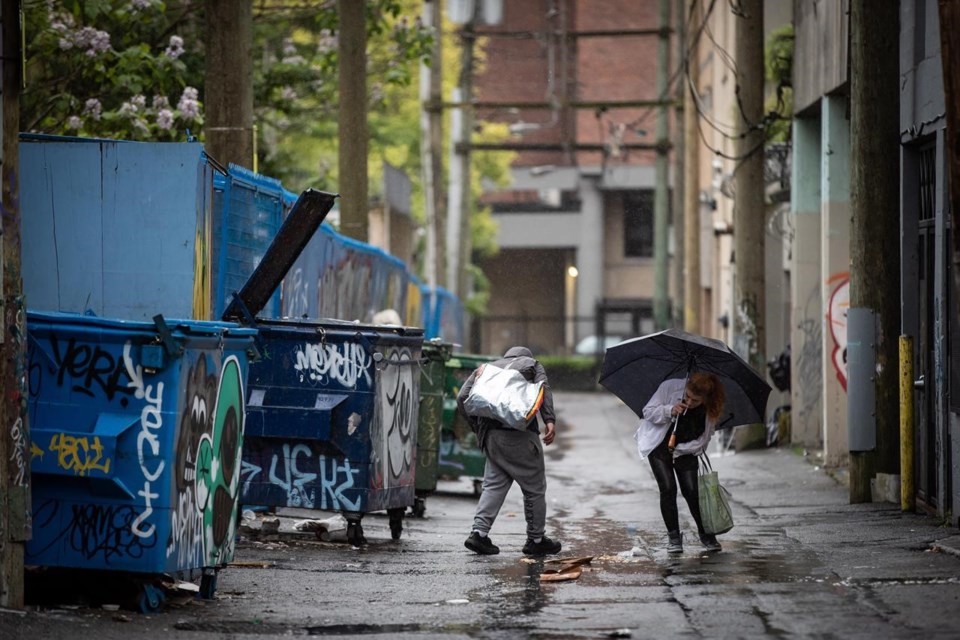VANCOUVER — British Columbia's provincial health officer says there are serious concerns among clinicians over diversion of drugs from the province's safer supply programs, but there's a lack of evidence about how pervasive the problem is.
Dr. Bonnie Henry's remarks came as she issued a report about the programs on Thursday, including a recommendation that the province increase the range of drugs available to include smokable fentanyl and other substances.
Henry said it was important not to let "rhetoric in the public domain … overcome the evidence that we have that putting people into the criminal justice system because of their drug use is not going to save lives and it's not going to help them."
"We need to replace it with the compassion and understanding that I know we have in this province," she said at a news conference.
Henry said the review stemmed from a series of "listening sessions" conducted with health-care professionals, researchers and drug users.
She said its recommendations sought to maximize the benefits of safer supply programs and mitigate their potential harms in an environment with "imperfect" evidence.
The report says an "ethical analysis" of prescribed safer supply concluded that interventions to reduce certain or severe harms were justified, even if it meant "uncertain harms" to the broader population.
Dr. Alexis Crabtree with the BC Centre for Disease Control said at the news conference that diversion of prescribed drugs such as hydromorphone was an "unintended consequence" of safer supply programs.
"We know from qualitative research about patients who have accessed prescribed safer supply that some of them do share or sell their medications, particularly when they feel those medications don't act as an adequate substitute to the unregulated drug supply," Crabtree said.
The review says concerns over diversion of prescribed opioids should be viewed as a failure to meet the needs of people who use drugs, who may trade or sell prescribed hydromorphone for more powerful substances such as fentanyl.
"The research suggests they have a variety of reasons for doing that and some of the motivations include supporting others who might not have access to prescribed safer supply and other unmet needs in their own lives," Crabtree said.
The report acknowledges that while there is "promising" and "largely positive" evidence to support prescribed safer supply, it is not strong enough for it to be called "fully evidence-based."
It nevertheless recommends that the province work with drug makers and distributors to expand choices for those at risk of overdose to include different forms of prescription heroin and fentanyl, since some users don't find the most commonly prescribed drug, hydromorphone pills, effective.
Henry's review also says the province should stop calling the program "prescribed safer supply," and instead refer to "prescribed alternatives" to toxic supply.
The report says 4,331 people have access to prescribed safer supply, a small fraction of at least 115,000 people with opioid use disorder in B.C., leaving the majority of drug users at risk of death from the toxic illicit market.
Mental Health and Addictions Minister Jennifer Whiteside said Henry's review would "help us to make the most of this important tool to save lives."
"We know that the poison drug crisis continues to have a devastating impact on families and communities across our province," Whiteside said.
"The focus of prescribed safer supply is to keep people who are already struggling with addiction alive in order to protect them from dangerous street drugs by connecting them to a doctor or a nurse practitioner that they trust so they can stabilize their lives and connect to care and treatment."
Whiteside said the province asked Henry to review the program last spring and the government is reviewing its recommendations and implementing a few already.
Whiteside said the province was working on "guidance" to health-care professionals who dole out the drugs, and also requiring "witness dosing" — observed consumption — for any new substances made available under safer supply programs.
She said the province would abide by Henry's recommendation to call the programs "prescribed alternatives" instead of "safer supply."
The name change, she said, speaks "to how it actually integrates with other care options for people who are living with addictions challenges."
"I've seen and heard first-hand from people across the province about the impact of this program on helping people to turn their lives around," she said.
"I heard so many stories about the small steps that people can take, like waking up in the morning and contacting a family member, phoning a family member and having a conversation, reconnecting with family or reading a book instead of having to wake up and go try to search for a source of illicit drugs.
"It tells us that people do recover, people do get better and we have to do everything that we can to support them."
The report was issued a day after the one-year anniversary of the decriminalization of possession of small amounts of opioids and other drugs in B.C., under a three-year exemption from Health Canada.
The exemption came amid an overdose crisis that has claimed almost 14,000 lives in B.C. since a public health emergency was declared in April 2016.
Deaths due to suspected illicit drugs hit a record 2,511 in the province last year.
This report by The Canadian Press was first published Feb. 1, 2024.
Darryl Greer, The Canadian Press

